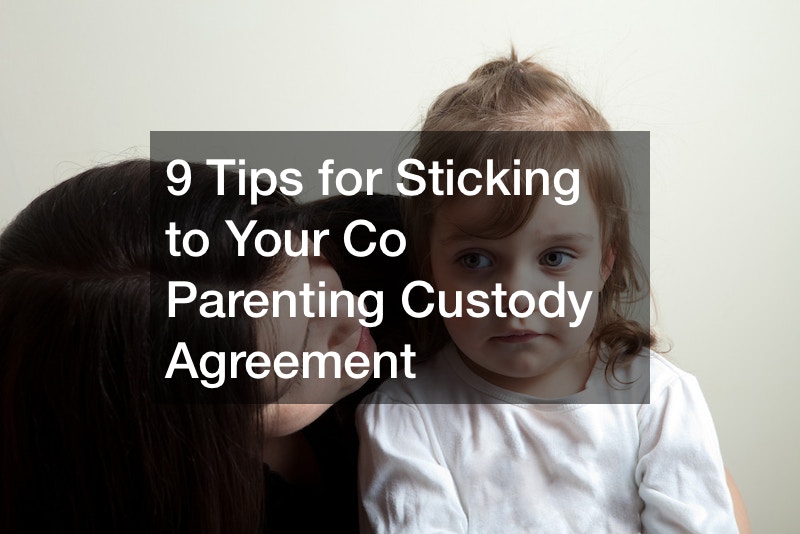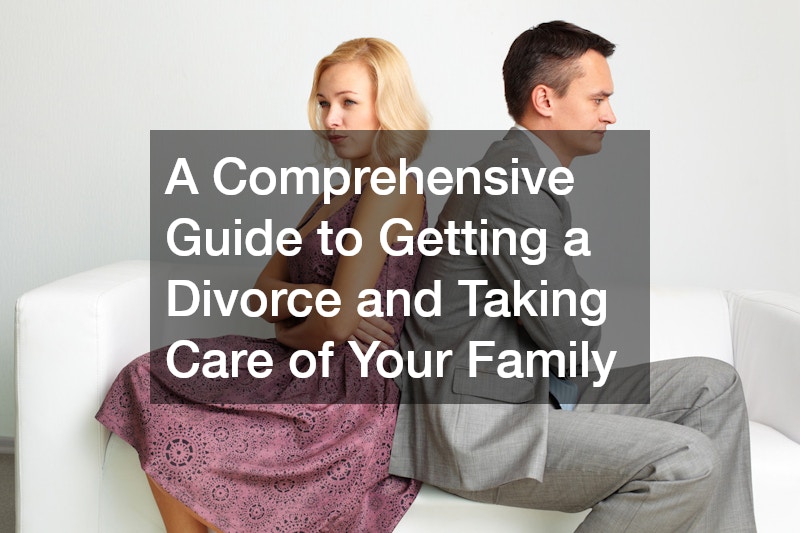
According to a 2020 assessment by Trusted Source, 60% of children in the US reside with their married biological parents. The remaining 40% live in various circumstances, including co-parenting. Co-parenting is sharing parental responsibilities for children between unmarried, divorcing parents or other parental figures.
Joint custody agreements can be demanding, aggravating, and stressful, especially if there is a tense relationship between the two individuals. It is common for people to worry about how their ex will be a parent or be anxious about child support and other financial matters involved.
However, it is essential to note that the level of trust between co-parents can significantly impact children’s mental and emotional health and the prevalence of anxiety and sadness. Therefore, it’s better to co-parent amicably while putting aside relationship concerns, particularly after a contentious divorce.
Advantages of Harmonious Co-Parenting

An efficient adherence to the co parenting custody agreement by the parties involved will enable the children to realize that they are more important than the disagreement that caused their parent’s marriage to fail and that their love for them will endure. Children who have cooperative relationships with their divorced parents also:
1. Feel safe: Children adjust to divorce and new living arrangements more swiftly and readily when they are confident that both parents love them unconditionally, which also helps them have higher self-esteem.
2. Have an Improved Understanding of Problem-Solving Skills: Children are more likely to learn how to peacefully and effectively resolve conflicts when they observe their parents working together after a divorce. Working with the other parent also sets a good example for them since you are forming a life pattern for your kids that will help them develop and uphold healthier relationships.
3. They Are Emotionally and Mentally Stable: A conflict between co-parents increases the risk that children will experience disorders like depression, anxiety, or ADHD, but when they harmoniously collaborate to co-parent, the kids are more likely to be emotionally and mentally stable due to the ideal foundation created by their parents which comforts them regardless of the current situation.
What Is a Co Parenting Custody Agreement?
A co parenting custody agreement, commonly referred to as a parenting plan, is a written document that specifies how the involved parties will raise their shared children following a divorce or other legal separation. It includes obligations, timetables, and visitation privileges, among other things. This agreement outlines the requirements both parents must meet after signing the contract.
Some state courts may require a co-parenting agreement during divorce proceedings, but it won’t be enforceable unless a judge signs it. Therefore, the most important component of shared decision-making is the ability to formulate an effective co parenting custody agreement with which each party is satisfied. A divorce custody lawyer can also draft the custody agreement if the parties fail to reach an understanding and require help from a neutral party.
How to Co-Parent Successfully

Whether you still get along with your ex or not, you will have to make many decisions together as a parent. Everyone benefits when there is cooperation and communication without arguments or outbursts. Separating your personal relationship with your ex from your co-parenting relationship is essential for successful co-parenting.
Therefore, both parents should start to view their relationship as a brand-new one in which the well-being of their children comes before their needs. Although It can be tough to communicate with someone you’d prefer to forget about, you may overcome co-parenting difficulties and establish a friendly working relationship with your ex for the sake of your children by following these nine suggestions.
They will help you abide by your co parenting custody agreement, be consistent in your actions, and settle disputes harmoniously, making the joint custody work effectively, thus allowing your children to flourish.
1. Be Consistent
Your children shouldn’t have to alternate between two dramatically contrasting disciplinary situations; hence the need for you and your ex-spouse to generally adopt consistent rules and discipline measures. For instance, if the child misbehaved outside your home, ensure the co-parent implements similar punishment systems for rule violations. The same procedure can be used to encourage good conduct.
Also, aim for consistency in your children’s schedules whenever possible, especially if they are in their early education stage, which is the daycare, since, at this level, they are most vulnerable to a slight change in their normal routine. It involves making meals, reviewing homework assignments, and ensuring their bedtimes are consistent, as it will help the kids adjust to living in two different households.
2. Make Crucial Decisions Together As Co-Parents

A co parenting custody agreement will require both parties to make crucial decisions together. Your relationship with your ex-spouse and the well-being of your kids depend on you being open, honest, and direct about critical matters. One of the vital factors in practicing this act is fulfilling the children’s medical requirements.
Keep each other informed before deciding to assign one parent the responsibility of speaking with the kids’ medical personnel, such as a family dentist, when scheduling vital appointments like a check-up of kids’ braces. A co parenting custody agreement may also require you to create a reasonable budget and maintain thorough records of shared costs. This process will require both parties to formulate the budget together.
3. Let Go of the Past
Your personal feelings— resentment, hurt, or anger—must be put on hold to focus on your children’s needs. Putting such emotions aside is a difficult yet vital aspect of learning to engage with your ex. Co-parenting is about your child’s happiness, stability, and future well-being, not about your sentiments or those of your ex-spouse.
It’s acceptable to feel upset and enraged, but your actions don’t have to be dictated by your emotions. Instead, let your actions be driven by what is best for your children, which includes working cooperatively with the other parent and fulfilling the co parenting custody agreement. Never complain about your ex-partner to your kids. When you need to vent your bad sentiments, friends, therapists, or even a devoted pet can be great listeners. Exercise can also offer a constructive means of venting.
4. Settling Conflicts Between Co-Parents
You and your ex will undoubtedly differ on some matters in the co parenting custody agreement. However, despite the circumstances, it is vital to note that maintaining respect for each other is paramount. Co-parenting should be built on basic decency, which involves being attentive, and acknowledging the other person’s perspective.
If you differ on critical subjects like a medical procedure, you should avoid stressing about minor details. For instance, your ex may insist on buying your child some contact lenses to fix their eyesight, even though you prefer normal glasses. To avoid complicating the situation, let it go and compromise since all that matters is your child’s rectification of their eye condition.
5. Simplify Transitions

Kids may have a tough time moving from one household to another as per the co parenting custody agreement. Since one cannot avoid these transitions, you can help your kids cope with the process. You should maintain a cheerful attitude when taking the kids to the other co-parent and help them pack their luggage as early as possible before they go, depending on their age, to ensure they don’t forget anything important.
You will also need to maintain a modest profile by spending some peaceful time alone with your children when they come into your house on the first visit since kids frequently require time to get used to the change. Unfortunately, some children under joint custody frequently resist moving from one parent to another. If this occurs, try to identify the cause as the issue can be simple to fix, such as giving your child more attention or altering your method of discipline.
6. Consider Co-Parenting Counseling Option
Consider co-parent counseling if you and your ex have problems getting along or abiding by the required co parent custody agreement measures. Getting a qualified therapist to assist you and your partner in becoming the best parents you can be, regardless of whether you are in a romantic relationship, is essential.
Many separated parents find it beneficial to discuss co-parenting and common parenting problems with an impartial, professional third party. There are many options, such as online counseling, where you don’t have to be in the same room as your ex since you can communicate using an intrinsically safe phone through video, text, or email, which are anonymous and significantly more comfortable than in-person counseling.
7. Maintain Effective Communication

Even though it may seem impossible, maintaining calm, regular, and intentional communication with your ex is crucial to the success of co-parenting. Everything starts with your mindset; therefore, consider your child’s welfare and the fulfillment of the co parenting custody agreement as primary priorities when speaking with your ex. It will enable you to ensure that your child is the main topic of conversation with your ex-partner.
Remember that you don’t necessarily have to see your ex in person; most conversations may be over the phone, text, or email. Determine whatever method of contact suits you best to develop a connection free from conflict. The following techniques can assist you in starting and maintaining productive communication, regardless of how you choose to make contact.
1. Set a Professional Tone: Think of your relationship with your ex as a partnership in which your ‘business’ is the welfare of your children. Write or speak to your ex in a pleasant, respectful, and impartial manner, just as you would a colleague.
2. Listen: Listening is vital in maintaining an efficient communication process with dignity. You should be able to communicate to your ex-partner that you understand their perspective, even if you disagree with them. Allowing your ex to express their thoughts won’t harm you, and hearing does not imply approval.
3. Do Not Overdo It: Remember that you will need to communicate with one another throughout your children’s entire childhood, if not longer. Even though it could be quite challenging initially, keeping in touch with your ex will show your kids that you and your co-parent are a team.
8. Seek Legal and Expert Guidance and Assistance
If you recently went through a divorce, you might have had enough of seeing divorce attorneys for the time being. But now, more than ever, you require the assistance of a qualified lawyer to update your estate planning. You must speak with an estate planner expert before making any decisions regarding your assets if your divorce settlement is complex. Failure to do so could break the terms of your co parenting custody agreement and divorce settlement.
If you designate your kids as beneficiaries and they are minors at the time of your passing, it will be necessary to assign a court guardianship for them until they turn 18. At that point, the kids will be entitled to the entire inheritance and may use the assets they inherit as they see fit; for instance, no one can restrict them in conducting an auto sale of an inherited vehicle once they attain the legal age. The court may assign the other parent (your ex-spouse) to oversee the finances while your children are still minors.
However, choosing your desired trustee and naming a trust as the beneficiary is much better since trust assets are shielded from careless spending, creditors, and even spouses. Therefore, if a trustee abuses the resources, they could be held accountable. You can decide when your children will inherit while preventing your ex-spouse from having access.
9. Designations of Beneficiaries
A will or trust cannot manage assets that allow you to designate a beneficiary, such as life insurance policies, individual retirement accounts, occupational retirement plans, annuities, investment accounts, health savings accounts, bank accounts, etc.
Unless that individual is deceased, a minor, or incapacitated at your passing, they will be paid directly to the beneficiary you have designated (in which case, a court may step in). Unless you specify differently in your divorce agreement, you will need to visit a family law firm and update the beneficiary you likely named when you married. Most of the time, you must ask for the necessary form and add a new beneficiary.
Co-parenting after divorce is difficult but manageable with careful preparation centered on the kids’ needs. A successful co-parenting arrangement requires agreement on ground principles, creating parental guidelines, and communicating constructively and effectively with your ex.



